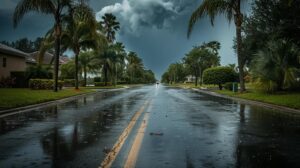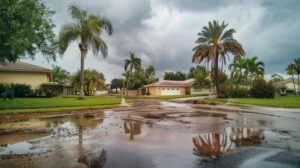Essential Steps to Safeguard Your Plumbing Before the Storm
Living in Port St. Lucie means dealing with the reality of hurricane season from June through November. While most homeowners focus on securing windows and stocking up on supplies, your plumbing system requires special attention to prevent catastrophic damage and costly repairs. A properly prepared plumbing system can mean the difference between minor inconvenience and thousands of dollars in water damage restoration.
Hurricane-force winds, flooding, and power outages can wreak havoc on your home’s plumbing infrastructure. From burst pipes due to debris impact to sewage backups caused by overwhelmed municipal systems, the threats are real and expensive. The good news? Most plumbing-related hurricane damage is preventable with proper preparation.
Understanding Hurricane Threats to Your Plumbing System
South Florida’s unique geography and infrastructure create specific vulnerabilities during hurricane season. Storm surge can overwhelm drainage systems, causing sewage to back up into homes through floor drains and toilets. Power outages disable sump pumps exactly when you need them most. Flying debris can damage exposed pipes, while flooding can contaminate your water supply.
The aftermath of Hurricane Ian in 2022 highlighted these vulnerabilities across our region. Many homeowners in Martin County and St. Lucie County faced extensive plumbing repairs that could have been prevented with proper storm preparation.
Essential Pre-Storm Plumbing Checklist
Shut Off Your Main Water Supply
Your first line of defense is knowing how to quickly shut off your home’s main water supply. Locate your water meter, typically found near the street or property line. The shutoff valve is usually positioned between the meter and your home. Turn the valve clockwise until it stops – this cuts off water flow to your entire house.
Practice this procedure before hurricane season arrives. During a storm emergency, you’ll need to act quickly, possibly in dark or dangerous conditions. If you’re unsure about your main shutoff location or operation, now is the time to have a professional plumber identify and test it.
Protect Against Sewage Backups
Sewage backups represent one of the most dangerous and expensive hurricane-related plumbing disasters. When storm drains become overwhelmed, sewage can reverse flow through your home’s drainage system, contaminating your living space with dangerous bacteria and causing extensive damage.
Install backflow prevention devices on floor drains, especially in basements and lower-level areas. These one-way valves allow water to flow out but prevent sewage from backing up into your home. While professional backflow testing ensures your existing systems work properly, additional protection during storm season provides crucial peace of mind.
Consider temporary measures like drain plugs or inflatable drain seals for floor drains in garages and basements. These inexpensive devices can prevent thousands of dollars in cleanup costs.
Sump Pump Inspection and Backup Power
Your sump pump works overtime during heavy rainfall, but it’s useless without power. Hurricane-related power outages often last days or weeks, leaving your basement vulnerable to flooding just when water levels are highest.
Test your sump pump monthly by pouring water into the pit until the float triggers operation. Listen for unusual noises, check that water discharges properly, and ensure the backup battery system functions correctly. Clean debris from the pit and verify that the discharge pipe directs water away from your foundation.
Install a battery backup system if you don’t already have one. Modern battery backups can operate sump pumps for 8-12 hours during power outages. For extended outages, consider a water-powered backup pump that uses your home’s water pressure to operate without electricity.
Secure Outdoor Plumbing and Fixtures

Hurricane winds can turn loose plumbing fixtures into dangerous projectiles while damaging your water supply lines. Walk around your property and secure any loose pipes, faucets, or irrigation equipment.
Shut off and drain outdoor water lines to prevent burst pipes from debris impact. Remove hose attachments and store them indoors. If you have a pool, turn off the circulation system and remove any loose equipment that could become airborne.
Outdoor water heaters require special attention in Jensen Beach and other coastal areas. While you can’t move the unit, ensure it’s properly anchored and consider temporary wind barriers if your area faces direct hurricane impact.
Water Heater Hurricane Protection
Your water heater represents a significant investment and critical home system. During hurricanes, protect this equipment through several key steps.
First, if flooding seems likely, turn off the power supply to electric water heaters at the circuit breaker. For gas units, turn off the gas supply valve. This prevents electrical hazards and gas leaks if the unit becomes submerged.
Consider draining your water heater if severe flooding is expected. Attach a garden hose to the drain valve and direct water away from your foundation. This reduces weight that could stress mounting brackets and prevents contamination of the tank interior.
For homes in flood-prone areas of Palm Beach County, consider elevating your water heater above expected flood levels. This permanent solution protects your investment year-round while ensuring hot water availability after storms pass.
Emergency Water Storage and Purification
Municipal water supplies often become contaminated or unavailable during hurricanes. Prepare by storing one gallon of water per person per day for at least three days. Use food-grade containers and rotate your supply every six months.
Before the storm arrives, fill bathtubs and large containers with additional water for cleaning and flushing toilets. Add a few drops of household bleach to stored water to prevent bacterial growth.
If your water supply becomes contaminated after the storm, boil water for at least one minute before drinking. Water purification tablets provide backup treatment options when boiling isn’t possible.
Post-Storm Plumbing System Recovery
After the hurricane passes, resist the urge to immediately restore full water service. Instead, conduct a systematic inspection of your plumbing system to identify potential damage before it becomes catastrophic.
Check for hidden water leaks by monitoring your water meter. Turn off all water fixtures and appliances, then check if the meter continues running. Any movement indicates leaks that require immediate professional attention.
Inspect visible pipes for damage, including cracks, loose joints, or displaced sections. Look for signs of sewage backup, including unusual odors or water stains around floor drains. Test your backflow prevention systems to ensure they weren’t damaged or clogged during the storm.
Professional Inspection and Maintenance Services
While homeowner preparation is essential, professional plumbing inspection provides comprehensive protection that DIY efforts can’t match. Licensed plumbers can identify vulnerabilities you might miss and recommend system upgrades that dramatically improve storm resilience.
Professional leak detection services use advanced equipment to find hidden problems before they become hurricane-season disasters. Thermal imaging and acoustic detection identify weak points in your plumbing system that could fail under storm stress.
Consider scheduling pre-season plumbing maintenance that includes drain cleaning, water heater inspection, and backflow device testing. This comprehensive approach ensures every component of your plumbing system can withstand hurricane conditions.
Creating Your Family Emergency Plan
Your hurricane plumbing preparation should integrate with your overall family emergency plan. Ensure every household member knows the location of the main water shutoff valve and how to operate it safely. Post emergency contact information for plumbing services in multiple locations throughout your home.
Prepare an emergency plumbing kit containing basic tools, drain plugs, waterproof tape, and temporary pipe repair materials. While these supplies won’t replace professional repairs, they can prevent further damage until help arrives.
Document your plumbing system with photos showing normal conditions. This documentation helps insurance claims and assists repair professionals in understanding your system’s original configuration.
Regional Considerations for Treasure Coast Homeowners
Homes in Stuart and Hobe Sound face unique challenges due to their proximity to the St. Lucie River and Indian River Lagoon. Storm surge can push saltwater into municipal drainage systems, increasing the risk of corrosive backups that damage plumbing fixtures and pipes.
Coastal communities like Jupiter and Tequesta should pay special attention to backflow prevention, as saltwater intrusion can contaminate freshwater supplies for weeks after a storm passes.
Inland areas including Palm City and Royal Palm Beach typically face different challenges, including overwhelmed drainage systems and potential well water contamination from flood runoff.
Long-Term Storm Resilience Improvements
Consider permanent upgrades that improve your home’s hurricane resilience year-round. Complete home repiping with modern materials provides better storm resistance than older pipe systems that may be more prone to impact damage.
Upgrading to storm-resistant plumbing fixtures and installing whole-house surge protection can prevent electrical damage to water heaters and other plumbing equipment during power fluctuations common in severe weather.
Professional Emergency Services
Even with perfect preparation, hurricane damage can overwhelm your plumbing system. When disaster strikes, having a trusted local plumbing professional makes all the difference in recovery speed and quality.
Top Notch Plumbing and Backflow Services provides emergency plumbing services throughout the Treasure Coast and Palm Beach County. Our experienced team understands the unique challenges Florida homeowners face during hurricane season and can quickly restore your plumbing system to full operation.
For emergency plumbing services during hurricane season, call 772-218-2669. Our commitment to fast response times and quality workmanship ensures your family can return to normal life as quickly as possible after severe weather events.
Conclusion
Hurricane season plumbing preparation isn’t just about preventing damage – it’s about protecting your family’s health, safety, and financial well-being. The time you invest in preparation now pays dividends in reduced stress, lower repair costs, and faster recovery when storms threaten our beautiful Treasure Coast communities.
Start your hurricane plumbing preparation today. Check your main water shutoff, test your sump pump, and schedule professional inspection of your backflow prevention systems. Your future self will thank you when the next hurricane warning is issued, and you’re confident your home is ready for whatever nature brings.
Remember that plumbing emergencies don’t wait for convenient times. Whether you’re dealing with pre-storm preparation or post-hurricane repairs, professional plumbing services provide the expertise and equipment necessary to protect your most important investment – your home.








